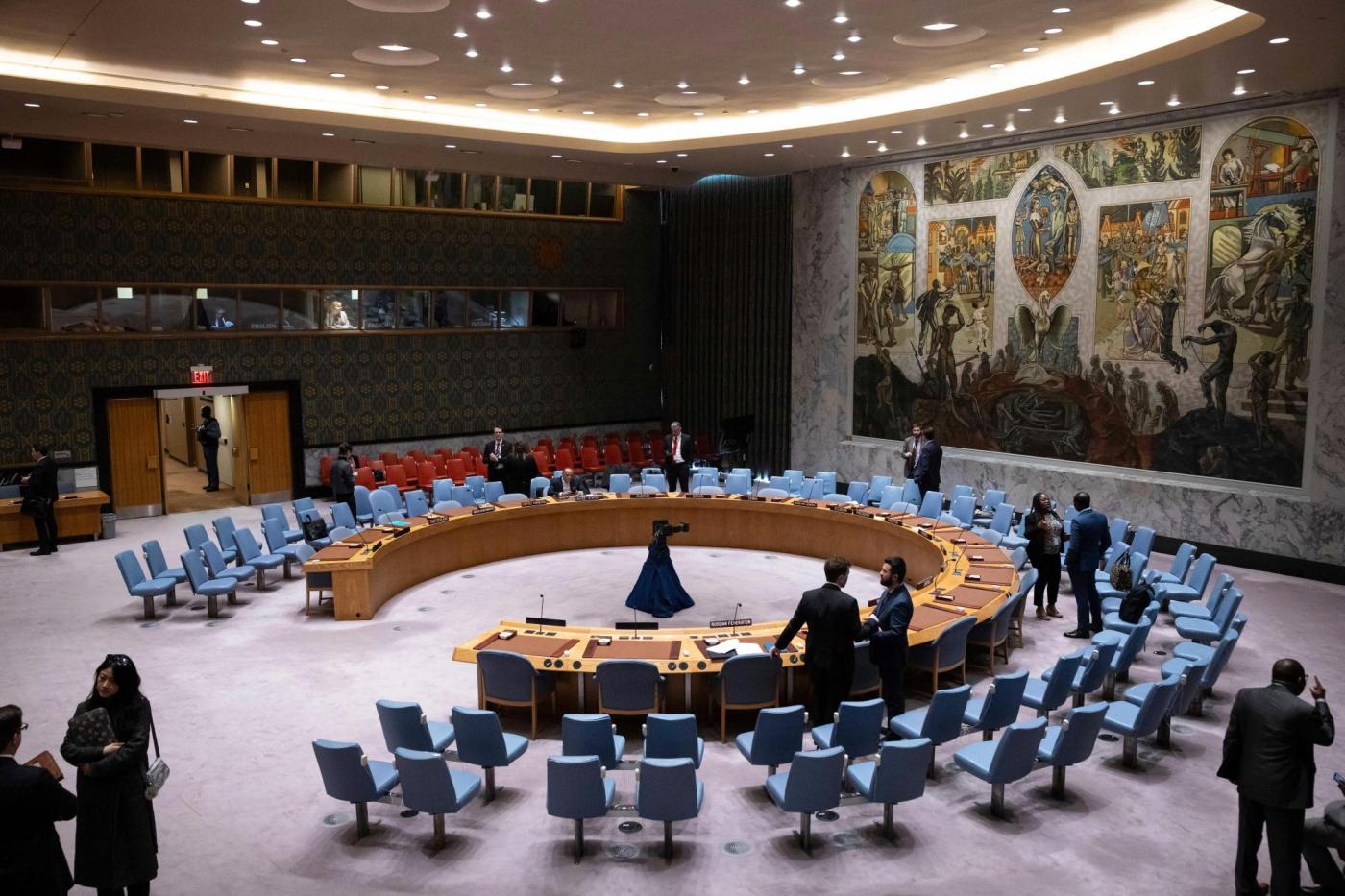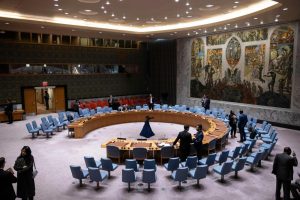
UN approves watered-down resolution on aid to Gaza without call for suspension of hostilities
By EDITH M. LEDERER (Associated Press)
UNITED NATIONS (AP) — After many delays, the U.N. Security Council adopted a watered-down resolution Friday calling for immediately speeding up aid deliveries to desperate civilians in Gaza but without the original call for an “urgent suspension of hostilities” between Israel and Hamas.
The vote in the 15-member council was 13-0 with the United States and Russia abstaining. It followed a U.S. veto of a Russian amendment that would have restored the call for a suspension of hostilities. That vote was 10 members in favor, the U.S. against and four abstentions.
The revised text was negotiated during a week and a half of high-level diplomacy by the United States, the United Arab Emirates on behalf of Arab nations and others.
U.S. Ambassador Linda Thomas-Greenfield said late Thursday the United States, Israel’s closest ally, backed it. The U.S. abstention avoided a second U.S. veto of a Gaza resolution following Hamas’ surprise Oct. 7 attacks inside Israel. Hamas has been designated as a terrorist organization by the United States, Canada and the European Union.
Council members met behind closed doors on Thursday to discuss a revised draft resolution, then delayed the vote so they could consult their capitals on the significant changes, aimed at avoiding a U.S. veto. A new text with a few minor revisions was circulated Friday morning.
The circulation of the new draft culminated a week and a half of high-level negotiations involving U.S. Secretary of State Antony Blinken. Between Tuesday and Thursday, Blinken spoke to the foreign ministers of Egypt and the United Arab Emirates three times each as well as to the foreign ministers of Saudi Arabia, Jordan, Britain, France and Germany.
The vote, initially scheduled for Monday, has been delayed every day since then.
Rather than watered down, Thomas-Greenfield described the resolution as “strong” and said it “is fully supported by the Arab group that provides them what they feel is needed to get humanitarian assistance on the ground.”
But it was stripped of its key provision with teeth — a call for “the urgent suspension of hostilities to allow safe and unhindered humanitarian access, and for urgent steps towards a sustainable cessation of hostilities.”
Instead, it calls “for urgent steps to immediately allow safe and unhindered humanitarian access, and also for creating the conditions for a sustainable cessation of hostilities.” The steps are not defined, but diplomats said if adopted this would mark the council’s first reference to stopping fighting.
On a key sticking point concerning aid deliveries, the new draft eliminates a previous request for the U.N. “to exclusively monitor all humanitarian relief consignments to Gaza provided through land, sea and air routes” by outside parties to confirm their humanitarian nature.
It substitutes a request to U.N. Secretary-General Antonio Guterres to expeditiously appoint “a senior humanitarian and reconstruction coordinator with responsibility for facilitating, coordinating, monitoring and verifying” whether relief deliveries to Gaza that are not from the parties to the conflict are humanitarian goods. It asks the coordinator to expeditiously establish a “mechanism” to speed aid deliveries and demands that the parties to the conflict — Israel and Hamas — cooperate with the coordinator.
Thomas-Greenfield said the U.S. negotiated the new draft with the United Arab Emirates, the Arab representative on the council which sponsored the resolution, and with Egypt, which borders Gaza, and others. This mainly bypassed the 13 other council members, several of whom objected to being left out, according to diplomats speaking on condition of anonymity because the consultations were private.
Guterres has said Gaza faces “a humanitarian catastrophe” and warned that a total collapse of the humanitarian support system would lead to “a complete breakdown of public order and increased pressure for mass displacement into Egypt.”
According to a report released Thursday by 23 U.N. and humanitarian agencies, Gaza’s entire 2.2 million population is in a food crisis or worse and 576,600 are at the “catastrophic” starvation level. With supplies to Gaza cut off except for a small trickle, the U.N. World Food Program has said 90% of the population is regularly going without food for a full day.
Nearly 20,000 Palestinians have been killed, according to the Gaza Health Ministry, since the war started. During the Oct. 7 attack, Hamas terrorists killed about 1,200 people in Israel and took about 240 hostages back to Gaza.
Hamas controls the Gaza Strip, and its Health Ministry does not differentiate between civilian and combatant deaths. Thousands more Palestinians lie buried under the rubble of Gaza, the U.N. estimates.
Security Council resolutions are legally binding, but in practice many parties choose to ignore the council’s requests for action. General Assembly resolutions are not legally binding, though they are a significant barometer of world opinion.


